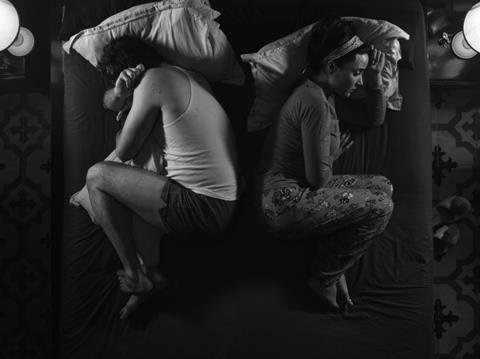Writer-director Nejib Belkadhi stars as a man battling mental illness in the midst of the Covid-19 lockdown

Dir/scr: Nejib Belkadhi. Tunisia. 2021. 95 mins.
A film shot during the Covid-19 lockdown, about the Covid-19 lockdown, Nejib Belkadhi’s Communion may touch a nerve with audience members who chafed against the enforced proximity and lack of freedoms of the pandemic’s early stages. Belkadhi stars in as well as directs the film, playing Kais, a Tunisian man whose existing psychiatric illness deteriorates markedly as the lockdown progresses. It doesn’t help that he is without work, his days vacant and open to the unhealthy thoughts which start to crowd in, while his wife, Sara (Souhir Ben Amara) is busy and useful, providing support to marginalised communities in the city. Although a little strident in its approach, the film tackles important issues: domestic violence and the disastrous impact of the pandemic on mental health.
Increasingly, the film is told from Kais’s (unreliable) perspective, a missed opportunity
The timeliness of the subject matter may work in the film’s favour. Then again, it may not — it’s possible that audiences largely prefer their viewing choices to offer escapism from the memories of lockdown rather than to reconnect with the period. Still, the film’s focus on mental illness should ensure that it is a conversation piece in any further festival programs, following on from its world premiere at the Red Sea Film Festival.
The flat black-and-white cinematography drains the life and colour from Kais’s world. Communion takes place predominantly in the tastefully decorated apartment that he shares with his wife, with the occasional panicked excursions to the city streets outside. Kais is not handling the stress of the situation particularly well. He layers mask upon mask, wears surgical gloves and douses everything with antibacterial spray. More concerning, he trawls the internet for miracle cures, sourcing chloroquine tablets at vast expense, having been snared by a rumour that they might be an effective treatment.
Sara, meanwhile, is thriving. The sound design accentuates this: the rooms ring with her laughter as she shares a joke over Zoom with her colleague. Kais, poised to dive into yet another Covid conspiracy rabbit hole on the internet, scowls his displeasure. To make matters worse, Sara has discovered that she is pregnant, something that the couple had previously decided against.
So caught up in her busy job, Sara doesn’t at first realise that her husband has run out of his antipsychotic medication. But before long, the threads of Kais’s mental health start to unravel. Increasingly, the film is told from Kais’s (unreliable) perspective, a missed opportunity. As Joachim Lafosse’s Cannes competition title The Restless demonstrated, the experiences of the carers of the mentally unwell are every bit as valid and relatable as that of their loved ones.
Hallucinated voices start to persuade Kais that the virus is, in fact, a good thing which will hasten the extinction of humanity. To this end, he sheds his mask and embarks on a reckless program of licking and hugging the infected, the better to serve the instructions in his head. The plight of the couple is real, but the tone of the film shifts uncomfortably as the story unfolds. A slightly ropey CGI virus, which floats over the horizon, tips the film from the realm of psychodrama into the absurd.
Production company: Propaganda Productions
Contact: MAD Distribution, Info@mad-solutions.com
Producer: Imed Marzouk
Cinematographer: Hazem Berrabah
Editing: Makek Chatta
Production design: Bessem Marzouk
Music: Cedric Perras
Main cast: Nejib Belkadhi, Souhir Ben Amara, Amos Jean Zadi, Feriel Chammari, Azza Barkous






![The Brightest SunScreen[Courtesy HKIFF]](https://d1nslcd7m2225b.cloudfront.net/Pictures/274x183/3/5/0/1448350_thebrightestsunscreencourtesyhkiff_312678.jpg)















![The Brightest SunScreen[Courtesy HKIFF]](https://d1nslcd7m2225b.cloudfront.net/Pictures/100x67/3/5/0/1448350_thebrightestsunscreencourtesyhkiff_312678.jpg)

